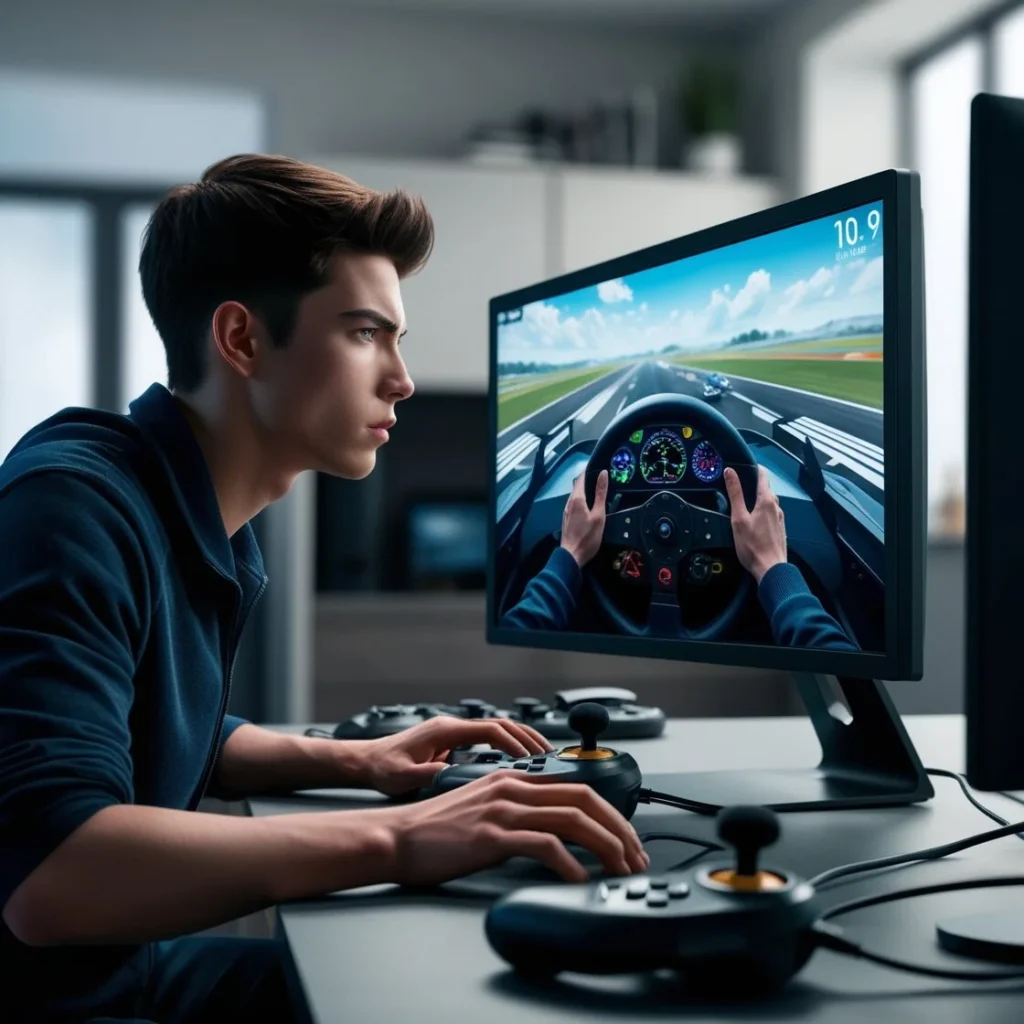Can Simulation Games Develop Real-World Driving Skills?
Simulation games, or “sims,” have become increasingly popular in recent years, not only as a form of entertainment but also as tools for education and skill development. From racing simulators to flight sims and city-building games, many wonder if time spent in these virtual worlds can actually translate into real skill. Can playing a flight simulator help you fly a real airplane? Does managing a virtual city improve your problem-solving abilities in real life? While it’s easy to dismiss these questions, research and anecdotal evidence suggest that simulation games can indeed impact real-world skills, though the extent varies depending on the game and the skills involved.
This article explores how sims can contribute to real-world skills, their limitations, and what factors influence whether the skills learned in these digital environments transfer to real-world scenarios.

Index
The Role of Simulation Games in Skill Development
Simulation games have long been recognized for their potential to mimic real-world environments in a safe, controlled way. Pilots, surgeons, and soldiers all undergo rigorous training in simulated environments before taking on real-world tasks. These professional simulations are designed to translate into real skill, allowing individuals to practice complex tasks without the risk of real-world consequences. But can the same principle apply to entertainment-based sims, such as flight simulators, racing games, or even life simulation games like The Sims?
One of the most cited examples is Microsoft Flight Simulator, a highly detailed game that replicates the experience of flying various types of aircraft. Pilots often use the software for practice, and some enthusiasts have reported that their knowledge from the game has helped them transition into real-world flying lessons more smoothly. However, the key here is that while Microsoft Flight Simulator can provide a deep understanding of aviation concepts, flying a real plane involves additional factors like physical sensations, risk management, and real-time decision-making that cannot be fully replicated by a game.
Motor Skills: From Racing Games to Real-World Driving
One area where sims have shown potential to translate into real skill is in improving motor skills, particularly in racing simulations. Games like Gran Turismo or F1 2023 offer players the chance to race highly realistic cars on real-world tracks. The physics engines behind these games are sophisticated enough that many professional drivers, including Formula 1 stars, use them to prepare for actual races.
Research has shown that playing racing games can improve hand-eye coordination, reaction time, and spatial awareness, all of which are crucial skills for real-world driving. A study conducted by the University of Rochester found that players of action and racing video games made decisions 25% faster than non-gamers without sacrificing accuracy. This enhanced decision-making ability could easily translate into real skill behind the wheel.
Moreover, eSports racers who excel in games like Gran Turismo have even transitioned into real-world racing. Nissan’s GT Academy, for example, has transformed some of the best sim racers into professional drivers. This is a strong case of virtual skills translating into tangible real-world expertise, but it’s important to note that these individuals also undergo rigorous physical training and practice on actual race tracks before competing professionally.
Problem-Solving and Strategic Thinking in Simulation Games
Games that require players to manage complex systems, like SimCity or Cities: Skylines, claim to teach valuable problem-solving and strategic thinking skills. In these games, players are tasked with managing resources, making decisions that affect the welfare of virtual citizens, and balancing various aspects of urban life, such as public safety, economy, and infrastructure. While these challenges occur in a fictional setting, the cognitive processes involved in solving them are similar to real-world problem-solving.
A 2014 study by the American Psychological Association found that playing video games, particularly strategy and simulation games, can improve problem-solving skills, as they require players to analyze situations, predict outcomes, and make decisions under pressure. These are essential life skills that can be applied in real-world scenarios, such as business management or project planning. However, while the cognitive skills honed in simulation games can translate into real skill in terms of decision-making and resource management, the practical application of those skills in real-life contexts may require additional knowledge and experience.
Sim Racing: Learning and Skill Development
Sim racing has become increasingly popular among motorsport enthusiasts and professionals alike. Games like Gran Turismo and iRacing offer experiences that go far beyond simple entertainment. These simulators play a significant role in developing motor skills and decision-making abilities that are essential in the real world.
One of the most notable aspects of sim racing is how it enhances driving skills. The advanced physics in these games accurately simulate vehicle reactions under various track conditions, allowing players to practice driving techniques and refine their responsiveness in high-pressure situations. Studies indicate that practice in simulators can lead to improvements in skills such as hand-eye coordination, reaction time, and spatial awareness.
Moreover, sim racing also fosters the development of strategic thinking skills. Players need to plan their races, considering variables like fuel consumption, tire wear, and the best approach to overtaking. This kind of strategic thinking is similar to what real drivers face, where every decision can directly influence the race outcome.
A testament to the transferability of skills acquired in sim racing to the real world is programs like Nissan’s GT Academy. This initiative has successfully transformed top sim racers into professional drivers, showcasing how virtual skills can translate into tangible expertise. However, it’s important to remember that these individuals undergo rigorous physical training and practical experience on actual tracks to complement their simulated practice.
Flight Simulators and Real-World Aviation
One of the most direct connections between simulation games and real-world skill acquisition comes from flight simulators. For decades, flight simulators have been used in both professional training and casual gaming. While commercial flight simulators are typically highly sophisticated and expensive, software like Microsoft Flight Simulator offers a surprisingly accurate recreation of real-world flying conditions. The game incorporates real-time weather, authentic cockpit controls, and realistic aerodynamics.
The question of whether playing a flight sim can translate into real skill is a bit more complex. Enthusiasts often report that their familiarity with navigation instruments, flight controls, and emergency procedures learned through simulators helps when they take real-world flying lessons. However, the tactile feedback of controlling an actual airplane, along with the physical experience of flight, involves many factors that simulators cannot replicate. Thus, while flight simulators can provide a valuable foundation of knowledge, hands-on experience is irreplaceable when it comes to mastering real-world aviation.
For many players, flight simulators provide an excellent way to explore aviation in-depth, offering a knowledge base that can indeed enhance real-world flying skills. That said, aviation authorities generally agree that while sims are useful for practice and training, they do not replace the need for in-person instruction and practical experience in a real cockpit.
Limitations of Sims in Translating to Real-World Skills
While there are numerous examples of simulation games helping to translate into real skill, there are also limitations. The biggest limitation lies in the fact that no matter how accurate or immersive a simulator is, it cannot fully replicate the physical and emotional experience of a real-world task. For instance, a racing simulator can teach you the physics of driving and improve your reflexes, but it cannot prepare you for the G-forces you feel when taking a sharp corner at high speed or the stress of competing in a real race.
Similarly, while strategy games can enhance problem-solving skills, they do not account for the unpredictability and complexity of real-world scenarios. In a game, all the variables are predefined, and while the outcomes may be uncertain, they are still governed by the rules of the game. Real life is far less predictable, and real-world problems often involve factors that cannot be simulated.
Moreover, simulation games often lack the accountability and consequences that come with real-world decisions. In a game, making a poor choice or crashing a virtual car has no serious repercussions, but in real life, these mistakes can be costly or even dangerous. As a result, while simulation games can offer a valuable foundation for skill development, they are no substitute for real-world practice and experience.
The Future of Sims and Skill Development
As technology continues to evolve, the line between simulation and reality is likely to blur even further. Virtual reality (VR) and augmented reality (AR) are already making simulations more immersive and realistic. VR flight simulators, for example, now offer a much more tactile and physically engaging experience than traditional screen-based sims. With the advancement of haptic feedback technology, players may soon be able to “feel” the weight of controls or the vibration of an engine, further enhancing the learning potential of these tools.
Additionally, AI-powered simulations are becoming increasingly sophisticated, allowing for more complex and dynamic environments that can better mimic real-world conditions. These advancements will likely increase the extent to which simulation games can translate into real skill, particularly in fields like aviation, medicine, and engineering, where precision and practice are essential.
As sims become more advanced, they will likely play an even larger role in professional training and education. Already, industries like healthcare, aviation, and the military are investing heavily in simulation technology to train their workforce. While entertainment-based sims may not reach the same level of sophistication, the skills learned through these games could still provide a valuable stepping stone toward real-world expertise.
Conclusion
Simulation games, whether for entertainment or professional use, offer a unique opportunity to practice and develop skills in a controlled environment. While they may not fully replicate the complexities of the real world, many sims can indeed translate into real skill when it comes to improving cognitive abilities, motor skills, and problem-solving techniques. From flight simulators to racing games, these virtual experiences have shown the potential to enhance real-world performance in specific areas.
However, it’s important to recognize the limitations of these tools. No matter how realistic a simulator is, it cannot fully replace the hands-on experience, emotional pressure, and unpredictability of real-life tasks. As technology continues to advance, we can expect simulation games to play an even larger role in skill development, but they will likely remain a complement to, rather than a replacement for, real-world experience.
